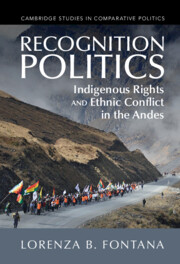Book contents
- Recognition Politics
- Cambridge Studies in Comparative Politics
- Recognition Politics
- Copyright page
- Dedication
- Contents
- Figures
- Tables
- Acknowledgements
- Acronyms and Abbreviations
- Introduction
- 1 Recognition Conflicts
- 2 Citizenship and Development in the Andes
- 3 Class and Ethnic Shifts
- 4 Recognition for Whom?
- 5 The Physical Boundaries of Identity
- 6 Unsettled Demographies
- 7 Struggles for Inclusion and Exclusion
- 8 Rethinking Recognition: What Are the Implications for Identity Governance?
- References
- Index
- Other Books in the Series (continued from page ii)
1 - Recognition Conflicts
Published online by Cambridge University Press: 05 January 2023
- Recognition Politics
- Cambridge Studies in Comparative Politics
- Recognition Politics
- Copyright page
- Dedication
- Contents
- Figures
- Tables
- Acknowledgements
- Acronyms and Abbreviations
- Introduction
- 1 Recognition Conflicts
- 2 Citizenship and Development in the Andes
- 3 Class and Ethnic Shifts
- 4 Recognition for Whom?
- 5 The Physical Boundaries of Identity
- 6 Unsettled Demographies
- 7 Struggles for Inclusion and Exclusion
- 8 Rethinking Recognition: What Are the Implications for Identity Governance?
- References
- Index
- Other Books in the Series (continued from page ii)
Summary
In this chapter, I offer an original analytical framework for what I call recognition conflicts. I propose a definition and a typology that can help identify these conflicts beyond the specific geographical and temporal boundaries of my empirical cases. The second part of the chapter is intended as a methodological and conceptual framework to orient the reader throughout the remainder of the book. I provide a rationale for the country case selection, a description of methods used and my methodological approaches, and a brief discussion of key concepts and terminology.
Keywords
- Type
- Chapter
- Information
- Recognition PoliticsIndigenous Rights and Ethnic Conflict in the Andes, pp. 27 - 55Publisher: Cambridge University PressPrint publication year: 2023

